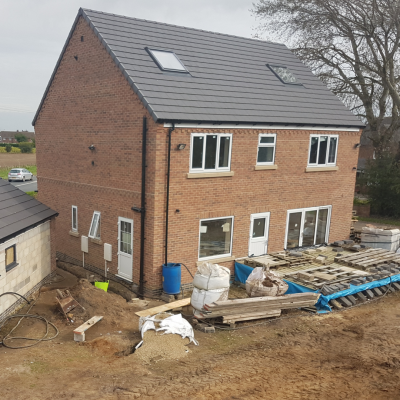Your self-build project: what do you need to budget for?
If you’ve watched Grand Designs (which self-builder hasn’t?!) you’ll have seen the same story over and over again. Another self-builder going over their budget. But how do you avoid this and what should you budget for?
Planning fees
You should expect to pay fees for drawings and plans prepared by architects or other professionals (e.g: structural engineers and quantity surveyors). You will also have to pay the normal council charges for planning permission, and for building regulations approval and inspections. These costs can be obtained on request from the local council.
Self-builder Andrew Theasby understands the reality of unforeseen costs after building his home in North Yorkshire.
I ended up spending hundreds and thousands of pounds on various reports and surveys the council needed. It wiped out every bit of savings we'd had ready for starting the build. It left me working overtime to cover the costs as we had no mortgage in place at this stage.
The various surveys and reports the council needed were relentless and costly - these are the hidden costs we didn’t plan for.
The couple ended up spending between £500 to £1,000 on each survey, some of which included topography, environmental impact, an acoustics survey, a bat survey and a drainage assessment.
He recommends creating a spending plan and “sticking to it”.
He says: “I had absolutely no idea how much things cost when I started so I found a budget template online and used this to plan how much I could afford to spend on foundations or roofing materials, for example.”
Suggested budget for planning fees:
- Take into consideration stamp duty (2% on plots over £125,000, 5% on plots over £250,000) and legal fees can be between £500-£1,000.
- According to the government’s website, the Planning Portal, the current cost for a full application for a new single dwelling is £462 but this fee differs in Wales, Scotland and Northern Ireland.
- Architects charge on average 7-15% of the total build cost (if this involves design and supervision). Fees vary depending on the location and complexity of the project and level of the service expected from the architect. To gather quotes visit www.architecture.com/find-an-architect/.
Top tip: Why not create your own spreadsheet using a Microsoft Office Excel template.
Mains services
If you have purchased a plot of land that is not already connected for mains services like electricity, gas and water, you will need to budget for these to be provided. Depending on the distance to the nearest services these charges can be considerable, and it is recommended you establish these early in your project planning by contacting the electricity, water and gas companies. They will have plans of where the nearest infrastructures exist and should be able to provide estimates of costs and the length of time to establish a connection (this can be considerable in some areas).
Suggested budget for mains services:
This is all dependent on area but you could be looking at up to £6,000.
Insurances
It is important to ensure you are adequately insured. Self-build insurance policies are available and can provide cover for:
Public Liability Insurance - This covers legal liability for claims made by any other person or body in respect of death, injury or loss arising from your building operations.
Employer's Liability Insurance - This is a legal requirement if you are employing anyone. This can also be a factor if any sub-contractor working for you has an accident on site where your duty to provide a safe working site could be called into question.
Contracts Works Insurance - Protects against losses through theft, vandalism, structural damage, fire, flood, storm damage, damage by delivery vehicles, etc.
Other insurance - You may also require special additional cover on occasions when any specialist services are being provided on site by third parties.
Suggested budget for insurances:
Self-build insurance is generally around 1% of projected build costs.
Materials
It’s always worth working closely with suppliers and manufacturers to ensure you can get what you want rather than simply specifying elements that meet the minimum requirements through Building Regulations. The more informed you are about the materials and products available, the better equipped you will be to conduct conversations about specification with your designer and builder.
By getting involved in the specification process at the early design and construction stages, you’ll also be empowered to make the key decisions on where to spend and where to save.
Taking a fabric first approach to design and construction is the best route to achieving a comfortable, durable, low-energy home for life – adding value to your home in the long run.
Let’s face it, planning your budgets is a hassle but employing the services of a budget estimator like Build Aviator can help speed your project along. They can provide detailed estimates of your project costs, including materials, plant and labour. You can receive bespoke reports including product summaries, bill of quantities, schedule of works, pricing sheets and tool hire information. They can also provide support with your SAP assessment, providing you with figures based upon your SAP product specification – ultimately giving you a smooth route to Building Control sign-off.

Contractors
You may need some assistance from plumbers or roofers, for example during your project. It’s important to gather a number of quotes to compare costs and have a sum in your head of how much you will spend on contractors. Some professionals are keen to link their fee to a percentage of the eventual construction cost. Be wary of this - you may be better negotiating a fixed fee for an agreed level of service. The Chartered Institute of Building may be able to point you towards local contacts. But there’s really no substitute for personal recommendation. So, if you are undertaking the work yourself, the best way to find good professionals is to ask other self-builders in your area if they’d recommend the people they used.
Finally, always make sure you have a contingency fund to act as a cushion against unforeseen costs.

How to find the right tradesmen
Finding a reliable builder or subcontractor can be difficult but having a good relationship with one is key – after all, they play a vital role in your self-build journey.

Choosing your materials
Choosing the right materials for your home is a crucial part of your self-build journey, helping you to build a dream home that is sustainable in the long-run.


